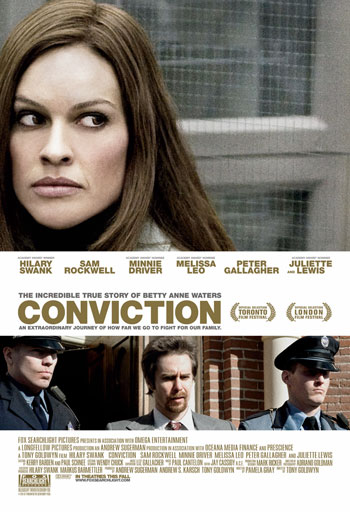LFF: Conviction – 3*
 It’s hard not to be a tad cynical about this Oscar-paint-by-numbers offering from director Tony Goldwyn and screenwriter Pamela Gray because that’s just what Conviction is: a shamelessly wanton Academy Awards contender with a double-statuette-winning leading lady in Hilary Swank to boot. It is, nevertheless, watchable.
It’s hard not to be a tad cynical about this Oscar-paint-by-numbers offering from director Tony Goldwyn and screenwriter Pamela Gray because that’s just what Conviction is: a shamelessly wanton Academy Awards contender with a double-statuette-winning leading lady in Hilary Swank to boot. It is, nevertheless, watchable.
Conviction has the melodrama, the struggle, and the real-life story claim, as well as doing its duty in highlighting the worthy cause of the organisation in the story, The Innocence Project, that tries to exonerate wrongly convicted people through DNA. By any standards, it’s Oscar gold.
That said, even with Swank putting her heart and soul into the role of legal eagle Betty Anne Waters who puts herself through law school to defend her older brother, Kenny, who is convicted of murder, and Sam Rockwell coming on board as Kenny, sentenced to life in 1983, the rather bland and play-safe script restricts what could have been a monumentally powerful film with plenty of scope for the audience to reflect on.
Understandably, there are bound to be legal factors that gagged Gray creating something zestier in nature; she makes sure she doesn’t overstep the mark, only going after the might that is the flaws in the US legal system, rather than the intriguing political aspects of the case at the time, namely the involvement of Martha Coakley, Attorney General of Massachusetts. There is also a tenuous film link between Waters getting her law degree and how she overturns her brother’s conviction, even though the film details other, peripheral aspects of the legal process that she must navigate to get accredited.
Sadly, the only controversy that the film managed to stoke is fuelling the wrath of renowned US feminist lawyer Gloria Allred who accuses Swank as executive producer (as well as star) of not involving the victim, Katharina Brow’s family, or showing them respect or compassion. There are so many layers and outcomes to this story that have been compacted to give Swank a showcase for an Academy Award, and the excuse that it’s not a tale of the crime and injustice, but a tale of a sister’s love for her brother doesn’t fully wash; there needs to be a universal hook for all, not just those fortunate enough to know a sibling’s love.
That’s not to say the story is not truly inspirational because it is. It’s an Erin Brockovich tale for the Noughties – without the corporate bite. The performances do not disappoint, considering the TV-style script and cinematography, and it’s fair to say that, in parts, Swank and Rockwell are utterly compelling as the sister and brother being pulled through an emotional wringer. Swank is like an aggressive Rottweiler most of the time that it’s exhausting to watch her crusading to free her brother. Rockwell revels in playing his vibrant character and his unpredictable mood swings, and is a joy to watch.
However, if anyone deserved an Oscar win for Conviction, it’s Juliette Lewis as Kenny’s not too bright and despicable ex, Roseanna Perry, for a repugnant but hilarious portrayal as the lying lush. Plus if there was an Awards category for clinching Best Accent, Minnie Driver ought to be a first contender as Waters’ friend and fellow lawyer Nancy Taylor, a character who also injects some much-needed humour into the intense proceedings.
It’s a word often used, but this film is ‘solid’ in its execution of the reputed real-life tale of struggle and retribution, and with Swank at the helm of a stellar cast, it will do well at the box office. What is disappointing is just how much better and consequential a film it could have been, had – we suspect – the film-makers been more daring in portraying events involving certain influential parties of the time, and got more involved in the legal side of things, rather than repeating the same dramatic encounters between sister and brother to hammer home the injustice.
It’s interesting how the film ends, too, understandably wanting to conclude on a high note, instead of revealing the rest of Kenny’s tragic story. This will leave some divided, but it seems like a cop-out, to be frank, when the real ending may have given the film its final sucker punch of reality at just how much time was (wasted) spent in the name of correcting a miscarriage of justice.
3/5 stars
By L G-K